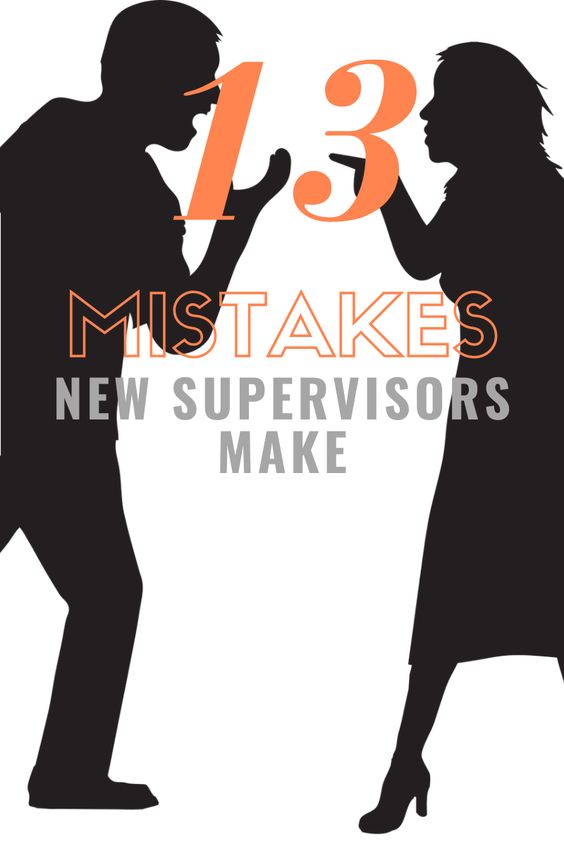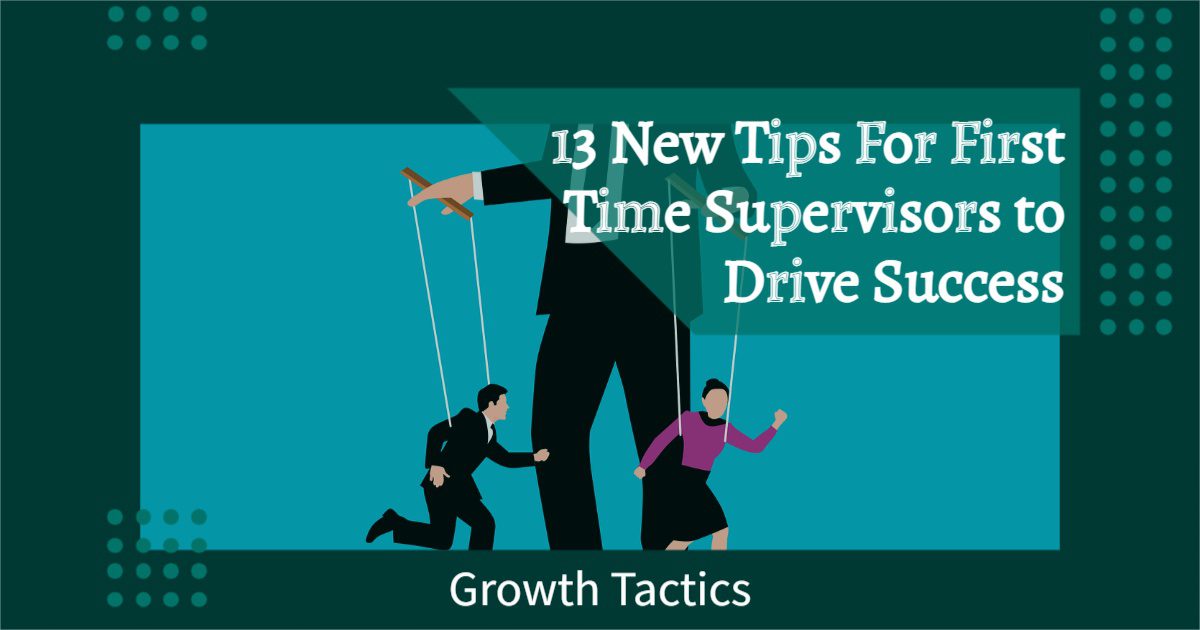As a new supervisor, there will be many mistakes you’ll run into and issues you’ll face that you haven’t dealt with before. There are some things you likely won’t know about managing people until it is too late.
I’ve made my fair share of mistakes when I was a new supervisor. That is why I’ve compiled this list of new supervisor tips to prevent you from making costly mistakes as a first-time supervisor.

Tips for a New Supervisor and Factors to Avoid?
Micromanaging
Micromanaging is something a lot of new supervisors do when they get hired into their new job. In reality, trying to control every aspect and fix every minor problem within a work area can lead to a lot of negative effects.
Negative effects of micromanaging.
Let’s talk about why micromanaging hurts your team. I’ve seen this firsthand in many of my roles, and it’s a big problem in many workplaces.
- Kills productivity: Your team slows down, always waiting for your okay.
- Pushes good people away: Your best workers will leave if you don’t trust them.
- Crushes spirits: Micromanaging tells people, “I don’t trust you.” That’s a real morale-killer.
- Stops new ideas: You miss out on your team’s creativity when you control everything.
- Holds people back: Making decisions helps people grow. Let them learn from their mistakes.
- Wastes your time: Don’t get bogged down in your team’s day-to-day tasks.
Remember, your job is to guide and support. Let your people shine. They might surprise you with what they can do when you step back a bit. Learn to delegate tasks when appropriate.
Related content: Why People Who Are Micromanaged Eventually Quit.
When is it necessary to micromanage?
There are times when it may be necessary to micromanage as a new supervisor. When you have new and inexperienced employees, they require a lot more direction and control that may warrant micromanagement.
Also, time-sensitive tasks may require a little more control by you as the supervisor. Another time that may require micromanagement is when new processes are implemented, but only if you know the process best.
Although there are times when micromanagement may be necessary, it is not a great way to lead and should be used sparingly.
Related content: 6 Times When Micromanaging Might Actually Be Necessary.
Being Too Hands-Off
While micromanaging can be an issue, so can being too hands-off as a first-time manager. There are situations where it’s acceptable to be hands-off but good supervisors need to know what is happening in their areas. It’s important to know when to be hands-off when to micromanage, and when to be somewhere in between.
When you have experienced employees who know how to do the job, it’s ok to be hands-off. When you have new employees or when you have problem employees, being too hands-off can lead to more problems.
It’s also good to show your employees that you are not afraid to get your hands dirty when needed. For example, if you are faced with an unusually large order, you may need to get in there and help your team get it done.
To learn about 10 common leadership styles and how to use them click here.
Dealing with Your Former Peers as a New Supervisor
When you get promoted from within the company, you may have to supervise your former peers. This can cause some special issues and put you in some tricky situations.
Some of these peers might be people you consider your friends. You don’t have to stop being their friend but you both need to stay disciplined and recognize the separation between your work and non-work relationship.
It’s important not to show favoritism to these individuals over everybody else. Therefore, they should be treated the same as everybody in your work area or this can cause issues with other employees.
Some of these peers may have been going for the same supervisory role that you got. Always show these people and everybody else under your supervision respect.
Furthermore, make sure you show them how much you value them and avoid giving off the attitude that you are better than them. If these people are deserving of a higher position work with them to find them another spot either within or outside the company. Given that they are great employees don’t forget to tell them how much you value them.
You may have not gotten along with all your coworkers before your promotion. If this is the case, you need to evaluate why you didn’t get along with those employees.
Was it because they were bad at the job?
If so it’s now your job to try to get them up to a proficient level. To that end, that may mean more training, more feedback, or maybe finding them a new position that suits their talents a little better.
If you didn’t get along with some of your peers because your personalities didn’t mesh well together, you need to wipe the slate clean. Above all, you and your now subordinates should have a different relationship that should be on a more professional level. Talk with these employees and let them know what you expect of them.
Feeling like an Imposter
It’s not uncommon to feel like an imposter as a first-time manager. For many, this is a very normal feeling. You work so hard to get the job, then you do and you may feel like you have no idea what you are doing. You are just trying to fake it until you make it.
There is nothing wrong with the feeling. The reason you are having that feeling is that you want to do a good job. Furthermore, nobody expects a brand-new supervisor to know everything or make the right call 100% of the time.
Even the most experienced supervisors make mistakes. Don’t be afraid to look for a mentor to help guide you and give you advice. Even though you will make mistakes, remember that someone saw something in you to allow you to be the leader.
Related content: 10 Steps You Can Use to Overcome Impostor Syndrome.
Inability to Make Decisions as a New Supervisor
As a new supervisor, making decisions can be a daunting task. The fear of making the wrong decision can lead to a delay in decision-making or even no decision being made at all.
This can be detrimental to your team, who is looking to you for answers and direction. While it’s natural to want to make the right call every time, the reality is that you won’t always get it right.
It’s important to remember that making the wrong decision sometimes is just part of the job. Every decision you make will come with risks and potential consequences.
However, the key is to gather as much information as possible and make the best decision you can with the given information. Trust yourself and your abilities to make informed decisions that are in the best interest of your team and the company.
One of the biggest pitfalls new supervisors fall into is overthinking decisions to the point of analysis paralysis. This is when you spend so much time analyzing and considering every possible outcome that you end up not deciding at all.
This can be especially damaging when your team is waiting for you to make a decision. It’s important to strike a balance between gathering enough information to make an informed decision and not getting bogged down in the details.
Another way to improve your decision-making abilities is to seek feedback and input from others. Your team members likely have valuable insights and perspectives that can help you make better decisions. Don’t be afraid to ask for their opinions or involve them in the decision-making process.

Lack of Communication
Effective communication is a crucial leadership skill that every supervisor must possess. Communication is the backbone of building strong relationships with your team members, setting clear expectations, and achieving goals. Lack of communication can lead to misunderstandings, confusion, and a lack of trust in leadership.
One of the most important things you can do as a supervisor is to communicate your vision and direction with your team. This ensures that everyone is on the same page and working towards the same goals.
Make sure that your communication is clear, concise, and consistent. This will help your team members understand what is expected of them and how their work contributes to the overall success of the organization.
Communication should happen in both group and one-on-one settings. Group meetings are an excellent way to provide updates, share information, and provide feedback.
One-on-one meetings, on the other hand, allow you to build stronger relationships with your team members, provide more personalized feedback, and address individual concerns or questions.
It’s also important to make yourself available to your employees to communicate. This means being approachable, attentive, and responsive to their needs. Encourage your team members to share their thoughts and ideas, and be open to their feedback. This will help you build a culture of transparency and collaboration, where everyone feels valued and heard.
Trying to Please Everybody
Many new bosses try to please everyone all the time. Trust me, trying to please your bosses and your employees can get very daunting. There are many times when you as the supervisor must determine what is best for your work area.
Therefore, sometimes this means doing something that your employees may not like at the time. On the other hand, sometimes this means having discussions with your boss explaining why it’s not best to do what they want.
Instead of trying to please everybody, you should be focused on doing what’s best for the company without sacrificing the morale of your team. Being the bad guy is not fun but your team will respect you if you can explain why you have to tell them no or make them do something they don’t want to at the time.
Not Enough or Bad Feedback
Feedback is the foundation for improvement and growth. Therefore, you should have feedback sessions with your employees often. This means both positive and negative feedback, formal and informal feedback sessions.
Also, allow your employees to give you feedback on how you’re doing as well. As a result, you may get some eye-opening results in areas where you are lacking.
If your supervisor isn’t very consistent about giving feedback, ask for it. Under those circumstances, a simple question like “What areas would you like to see me improve at my job?” could be very helpful in your growth as a leader.
Not Having a Defined Vision or Goals
Having a vision and goals provides a sense of purpose and direction for you and your team. You should have both short and long-term goals for both yourself and your team. As a leader, you inspire your team with your vision.
After all, everything you guys and gals do should fit into your vision and bring you closer to achieving your goals. If it doesn’t, then that task should be reevaluated for relevance. Every team member must know and understand your vision and goals accordingly. All in all, if they understand how they fit into the vision, they will help you reach your goals.
For help creating a vision statement click here.
Hiring the Wrong People
Hiring the right people is extremely important for supervisors and the overall work environment. After all, hiring the right person for the job can make a supervisor’s life very easy. However, hiring the wrong person can make a supervisor’s life very hard. This is one of the crucial tips for a new supervisor.
As a supervisor, you want to ensure you have as many candidates for the job as you can by being involved in the recruitment process. The more candidates you have the better the chances that you will find what you are looking for.
Furthermore, go into recruitment, interviewing, and onboarding with a plan. Understand that someone may not be the best fit for the position you are hiring even though they are a great worker. Know what qualities you are looking for in the person before you begin the hiring process.
Once you hire somebody the process is not over. Take an active role in onboarding your employees. Consequently, not doing this could turn a good hire into a bad employee or possibly end up with that employee leaving the company. Don’t just drop this employee off with another employee to train them, follow up and ask how it’s going.
Ensure you give these employees your expectations, visions, and goals early. Also, give these employees frequent feedback and ask them to give you feedback or suggestions on what you and your employees can do better. Believe it or not, these outside eyes can provide some valuable insight.
Related content: Why Employee Motivation Is Important (& How to Improve It)
Not Understanding Employee Motivation
Understanding what motivates your employees is crucial for any supervisor. Employee motivation is not always straightforward, and it can vary significantly from person to person.
Each employee has their own unique set of values, goals, and aspirations which influence what motivates them. As a supervisor, it is your responsibility to get to know your employees and understand what drives each team member. Use that knowledge to help them achieve their goals.
Motivations can take many forms, such as money, time off, power, promotions, public recognition, a sense of purpose, and many other things.
Some employees may be motivated by financial incentives, while others may be more driven by a sense of purpose or the opportunity for personal growth.
Some employees may be motivated by the chance to work on challenging projects, while others may be more motivated by the prospect of public recognition or awards.
It’s important to recognize that more than one thing may motivate an employee. For example, an employee may be motivated by a combination of financial rewards and the chance to work on a challenging project.
One effective way to identify what motivates your employees is to simply ask them. Take the time to sit down with each team member individually and discuss their goals, aspirations, and what they find most rewarding about their work. This will help you gain a better understanding of what motivates each employee and allow you to tailor your management style and incentives to suit their individual needs.
Trying To Do Too Much as a First-Time Supervisor
It’s hard to come into a new position and not take on every task or extra project your boss has. Eventually, this can hurt a new boss. This can lead to burnout very quickly because you can only sustain trying to do everything for so long. You will also likely put out work that is not high quality because you are struggling to keep up.
Your work center will suffer as well. As a result, your time helping, mentoring, and building working relationships with your employees is limited. As a matter of fact, as a new supervisor prioritization is your key to success. You can’t do everything, especially on your own.
There’s nothing wrong with discussing priorities with your boss. When it’s all said and done, you may be surprised that something that seemed like a hot priority to you is not such a priority to your superior.
Trying to make too many changes within the work center is an issue many times too. Employee morale and productivity may be hurt when you make too many changes too quickly.
Take your time to observe for a little bit when you first start supervising so you get a true idea of what is working and what isn’t. With this in mind, get feedback from your employees on what they think would make the work area more efficient.
When you are ready to make changes to the area, ensure you are communicating with your team the reasons why you are making those changes. Sharing your vision and getting your employees to buy in consequently makes the whole process exponentially easier.
Not Understanding Your Role as a New Supervisor
Many times workers think they know what the supervisor’s job is until they get into that position. When you are in the supervisory position there are a lot of things that can get confusing when it comes to roles.
Some people have a hard time letting go of the job they were doing and tend to spend a lot of time helping out in that area instead of doing the supervisory tasks needed to keep the area running effectively.
Other times, new supervisors go on power trips thinking they are better than everyone else because of their new job. A strong leader knows that the workers below them are just as important if not more important than they are. Even though you will have to tell people what to do at times, it’s important to always do it with respect. Your employees can make or break you as a supervisor.
Above all, if you find yourself struggling to understand your role as a supervisor, talk to your boss. Find out what their vision is for you. Given that information, you can determine your vision and goals for your work area.
Summary
Even seasoned supervisors aren’t perfect all the time. The important part is to always strive to be better than you were the day before. Learning leadership styles and tactics is a great way to improve your skills but even reading all the strategies in the world can’t replace experience. Therefore, practicing various leadership styles and tactics to find out what works best for you in various situations is essential in your leadership development. As hard as it seems in the beginning, it does get easier and leading becomes natural.
If found this article on tips for a new supervisor useful don’t forget to share using the buttons below.


